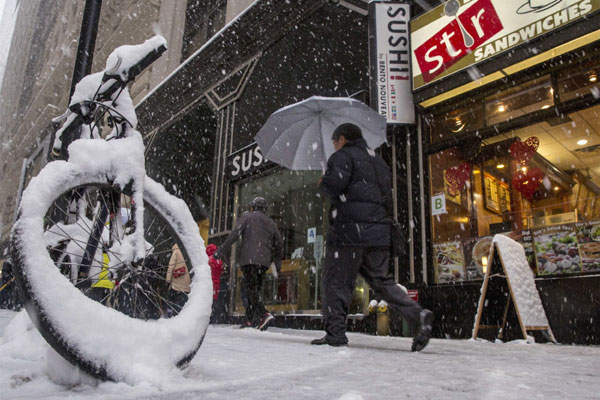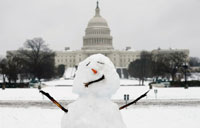 |
|
People walk through the snow during the morning commute in New York's financial district near Wall St. February 13, 2014. [Photo/Agencies] |
WASHINGTON _ The winter storms barreling across much of the United States are undercutting the nation's economy just when signs of stronger growth had begun to emerge.
Retail sales tumbled in January after a smaller decline in December, the government said Thursday. The news came as another snowstorm blanketed a third of the country, likely ensuring that February will mark a third straight month of weak job growth.
Some economists responded by lowering their overall growth estimates for the January-March quarter. Freezing weather usually slows the economy during winter before growth picks up once temperatures rise again. But the onslaught of snow days this winter could prolong the slowdown.
For one thing, harsh conditions tend to rob many hourly workers of income. The avalanche of nasty weather means that waiters, limousine drivers and store employees might never recoup their lost wages later in the year, said Diane Swonk, chief economist at Mesirow Financial.
Snow days that were declared across the Eastern Seaboard forced many parents to stay home from work. Atlanta closed its schools for a third straight day, Philadelphia for the fifth time this winter.
At the same time, home heating bills have escalated for many such families, many of whom have no choice but to reduce spending elsewhere.
"You disrupted incomes for some people permanently," Swonk said.
|
 |
|
 |
She estimates that economic growth during the first three months of this year will be "well below" a 2 percent annual rate _ a steep drop from the 3.2 percent rate in the final quarter of 2013.
Several major retailers and restaurant chains have blamed winter storms for chilling sales. McDonald's, the world's biggest burger chain, said bad weather hurt its U.S. sales last month. Whole Foods said weather was one reason its fiscal first-quarter profit and revenue fell below expectations. And Wal-Mart, the world's largest retailer, in late January blamed severe weather for a fourth-quarter drop in revenue.
Based on data from 50,000 retailers, sales plunged 9.6 percent during the height of the polar vortex that gripped much of the nation in January compared with the same period last year, the firm Applied Predictive Technologies said.
For all of January, retail sales fell a seasonally adjusted 0.4 percent, the Commerce Department said Thursday. That marked the second straight decline after a 0.1 percent drop in December.
The retail sales report is the first look at last month's consumer spending, which accounts for about 70 percent of all economic activity. Many economists had predicted that stronger consumer spending this year would cause growth to accelerate.
But auto sales fell 2.1 percent in January. The industry reported a 3 percent drop compared with a year ago, the first year-over-year drop since August of 2010.
|
|
|
|
|
|
|
|
